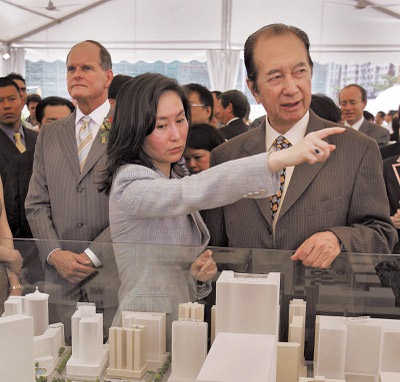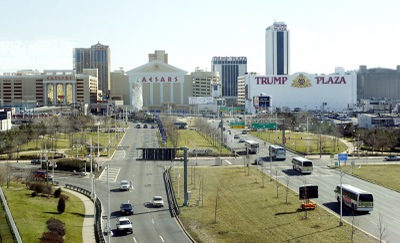Tuesday, April 20, 2010 | 2 a.m.
Sun archives
- Macau giving fits to Nevada regulators (4-11-2010)
- Nevada regulators analyzing Macau casino activity (4-1-2010)
- Wynn Macau profit rises 1.4% to $266 million on lower costs (3-24-2010)
- Asian casino magnate denies organized crime ties (3-18-2010)
- MGM Mirage disputes N.J. regulators’ authority to vet its partner in Macau (2-1-2010)
- New Jersey could come between MGM Mirage, Macau (12-29-09)
- MGM Mirage executive Gary N. Jacobs resigns (12-18-2009)
- Las Vegas Sands moves forward with Macau project (11-11-2009)
- N.J.: MGM Mirage should ‘disengage’ from Macau partner (5-19-09)
- MGM Mirage, Boyd gaming license investigation reopened (7-31-09)
- Ho, MGM Mirage deal should pass regulators (7-19-05)
- MGM Mirage talks continue in Macau (2-10-04)
Although the stated topic of New Jersey gaming regulators’ report last month was MGM Mirage’s partnership with Hong Kong businesswoman Pansy Ho, the underlying theme was the shady way casino VIP rooms are run in Asia’s gambling mecca, Macau.
And while the immediate effect of the report is MGM Mirage’s exit from the casino business in Atlantic City, that underlying theme carries much broader implications. Given the information leveled against Macau’s casino industry, it would be difficult, if not impossible, for New Jersey regulators to approve any Macau casino deal involving operators of Atlantic City casinos, regulatory experts say.
That poses a potential problem for companies operating in Atlantic City that want to expand to Macau — Harrah’s, for example — and for companies in Macau that might one day want to expand into New Jersey — Wynn Resorts and Las Vegas Sands, for example.
Harrah’s would “very much like to get involved in the Macau gaming industry” and is still evaluating the company’s prospects after acquiring a 175-acre golf course there for $578 million in 2007, company spokesman Gary Thompson says.
One of the company’s options to obtain the right to build a resort on the land would be to partner with an existing license holder. And yet, the Macau government has imposed a moratorium on new licenses and is considering other ways to curtail growth viewed as too much, too fast.
In the meantime, the company has made changes to its costly purchase by redesigning the course and building a golf school, with plans to add other amenities.
If Harrah’s does wind up securing a lucrative license in Macau, it could choose to follow MGM’s lead and give up New Jersey. But MGM Mirage only had to sell one in Atlantic City. Harrah’s has four there.
•••
The VIP rooms in Macau casinos that cater to big gamblers typically have their own brand names and security personnel, and they are operated by third parties that rent the rooms from the casinos and split gambling proceeds with them.
Marketing middlemen called “junkets” establish close relationships with these gamblers and issue credit. They also bring these bettors to the rooms and obtain a commission from casino operators in return.
Junkets exist because there are few financial records in China to tell a businessman whether someone is a good credit risk, says I. Nelson Rose, a California-based gaming law expert who also teaches at the University of Macau. So casinos must rely on junket representatives to gain access to high rollers with the means to gamble and repay debts. The junket system is rooted in a culture “where everything is built on long-term relationships, verbal contracts and poor financial records,” Rose says.
The system is ripe for money laundering, Rose and government reports say, because
it lends a secrecy to the gambling business that can be problematic for casinos trying to follow the law.
Some gamblers in China, which controls how much money can be taken out of the country, gain access to huge bankrolls by criminal means that might only be known to the junket reps, he says.
While Macau casinos make a fraction of the profit they could reap if they didn’t have to pay junkets, they benefit by not having to collect gambling debts that are unenforceable in mainland China, where casinos are illegal and where many of Macau’s gamblers live. The junkets operate outside the law and, like the days when the mob owned Las Vegas casinos, can use illicit means to force debtors to pay up.
Thanks to Nevada’s credit collection laws, casinos’ loans to gamblers generate paper trails for review by Nevada regulators, and unpaid debts are collected by force of law rather than by mob muscle. Macau’s VIP rooms have no such paper trail, despite having cash reporting rules on the books, according to regulatory experts.
•••
Third-party-operated VIP rooms “provided organized crime the entry into the Macau gaming market that it had previously lacked,” the New Jersey report says.
The report cites language repeated in State Department documents from 2003 through 2008: “Under the old monopoly framework, organized crime groups were closely associated with the gaming industry through their control of VIP gaming rooms and activities such as racketeering, loan sharking and prostitution. The VIP rooms catered to clients seeking anonymity within Macau’s gambling establishments and received minimal official scrutiny. As a result, the gaming industry provided an avenue for the laundering of illicit funds and served as a conduit for the unmonitored transfer of funds out of China.
“Although the arrival of international gaming companies has improved management and governance in all aspects of casino operations, concerns about organized crime groups and poorly regulated junket operators’ associations with the VIP rooms remain,” the State Department says.
Obtaining a junket license in Macau is a cursory process only, and no thorough investigation of the individual’s personal and business associations is conducted, experts say.
Regulators in most places with legalized gambling, on the other hand, require in-depth background checks of executives and managers involved in gambling activities. In Nevada, such checks — considered the business equivalent of a strip search — are intrusive and unappealing yet are accepted as a necessary cost of doing business in the casino industry, where such checks were instituted as protection against mob infiltration and fronts for criminal operations.
Macau’s top casino regulator, Manuel Joaquim das Neves, director of Macau’s Gaming Inspection and Coordination Bureau, bristles at the allegations that his department isn’t doing its job.
All junket operators, he says, must be licensed and undergo periodic “assessments of their suitability to hold such licenses.” Individual junket reps are required to renew their licenses annually and undergo a “probity check” by Macau police every three years. Junket companies must undergo such checks every six years.
But ultimately, das Neves adds, casinos, and not government regulators, are responsible for the behavior of their junket operations within the VIP rooms. By law, any background investigations by gaming regulators are confidential, though the identities of licensed junkets and their shareholders are public. Casinos may only engage third-party operators that are licensed, and casinos are responsible for monitoring such operations, he notes.
Critics say this arrangement allows for regulators to take a passive role when a proactive one is needed to root out organized crime.
A former Nevada regulator, who declined to be identifed, says “Macau has good regulations on paper but there’s been little enforcement or compliance.” Given the massive profits generated by high-rolling gamblers who wish to remain anonymous, “there’s no incentive,” he says.
Las Vegas Sands, for example, has attempted to eject individuals believed to be engaging in illegal and illicit activities from its casinos, but the company has been unsuccessful in part because of a lack of government assistance, the source says.
Las Vegas Sands declined to comment on that.
Dennis Neilander, chairman of Nevada Gaming Control Board, and das Neves say their respective governments cooperate with one another in the sharing of information to enable better regulation. But Macau’s privacy laws have prevented Nevada from obtaining a formal information-sharing agreement with Macau like those it has with many other casino regulators around the world. Such a document would compel Macau officials to turn over confidential documents. Its absence should raise a red flag for U.S. regulators, a former Nevada regulator says.
Neilander says Macau is working to improve its regulations.
“They are in the process of reforming a 40-year-old system,” he says. “They can’t do it overnight but they’re obviously trying.”
And yet, regulations in nearby Singapore, which legalized casino resorts in 2005, look much like those in Nevada and New Jersey. They require casino operators and junkets to submit to personal and business background checks, including turning over confidential documents and filing photos and fingerprints with police. Moreover, Singapore’s rules prevent independently operated gambling rooms and allow authorities to reject applicants based on reputation or association. Singapore’s first casino resort opened in February and a second, Las Vegas Sands’ Marina Bay Sands resort, opens April 27.



Join the Discussion:
Check this out for a full explanation of our conversion to the LiveFyre commenting system and instructions on how to sign up for an account.
Full comments policy